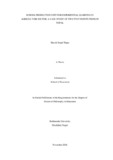
Please use this identifier to cite or link to this item:
https://hdl.handle.net/20.500.14301/466| Title: | School Production Unit for Experiential Learning in Agricultural Sector: A Case Study of two TVET institution in Nepal |
| Authors: | Thapa, Harish Singh |
| Citation: | Thapa,H.S. School production unit for experiential learning in agricultural sector: A case study of two TVET institution in Nepal. |
| Issue Date: | Nov-2024 |
| Publisher: | Kathmandu University School of Education |
| School: | SOED |
| Department: | DODE |
| Level: | Ph.D. |
| Program: | PhD in Development Education |
| Abstract: | The study of the role of the school production units in promoting students' experience in the agricultural sector in Technical Education and Vocation Training. School production units are the institutional setup for enhancing the work-based and experiential learning of the students. Experiential learning in TVET institutions, especially in agriculture, promotes the learners' competencies to understand the agricultural value chain. The present study employs a qualitative case study approach to investigate the subsequent research questions: a) How do students, instructors, and administrators describe experiential learning approaches through school production units in TVET institutions? b) How do students experience industry-related skills in the school production unit? c) How do school production units cope with challenges to ensure institutional work-based learning? I used a qualitative case study approach. The study included 20 participants, including the principal, coordinator, instructor, and students of the TVET institution who are involved in the production unit. I used face-to-face semi-structured interviews with administrators, instructors, and students, as well as direct observations of agricultural farms, veterinary hospitals, animal farms, and archival data of the TVET institutes. I analyzed the data by following criteria such as coding, categorizing, and making themes of the information and field notes. By applying constructivism as a theoretical approach, this study's findings show three primary work-based learning approaches to the school production units - learning by doing, student-centered learning, and learning by collaboration in the school production unit. Likewise, this study also indicates that students improve their skills by developing subject-specific technical and interpersonal skills such as communication, problem-solving, time management, teamwork, cooperation, collaboration, personal skills, and entrepreneurial skills through experiential learning in the production unit. It also reveals that to achieve the desired outcomes from the school production unit, stakeholders and the education system face the following challenges during experiential learning activities: managing resources, more holidays in the academic calendar, and proper marketing techniques are major challenges during the production units; Likewise, technology integration, sustainability, diversification in production, and flexible learning are the major future aspirations of the experiential learning in the school production units. Despite the challenges of school production units, such as irregular academic calendars or yearly plans, regulatory compliance, curriculum demands, poor governance, and the marketing and promotion institution, work-based experiential learning has been promoted. The study concludes that strengthening production units in TVET institutions helps increase students' experiential learning, aligns students' career aspirations with prospective employers' goals, and adequately satisfies their skill demands by integrating learning approaches and skills. This study indicates the pathways for TVET institutions, governments, and policymakers to restructure work-based learning to improve existing practices and enhance their dedication to the development of the TVET sector. |
| URI: | https://hdl.handle.net/20.500.14301/466 |
| Appears in Collections: | Theses |
Files in This Item:
| File | Description | Size | Format | |
|---|---|---|---|---|
| Harish_Thapa_Thesis_Final.pdf | 2.05 MB | Adobe PDF |  View/Open |
Items in DSpace are protected by copyright, with all rights reserved, unless otherwise indicated.